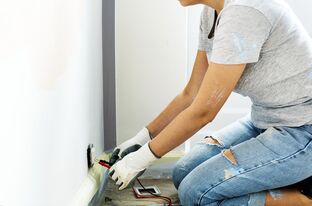
November 11-International Energy Conservation Day. This holiday is still young and has been celebrated since 2008, which is understandable: humans have never needed such a large number of equipment to supplement electricity. This article will explain why you need to save electricity, how to properly save energy, and more importantly, how not to save energy.
Why do we need to save energy
Since childhood, we have regarded the need for energy saving as an attempt to save personal finances. And now, when many of us start to make money, the huge temptation is to allow "don't save for yourself". However, not only to save energy, but also to save energy. This is a kind of goodwill, a step taken by conscious people in protecting and maintaining the environment.
- By saving 100 watts of electricity, you can save 50 kilograms of coal, 30 liters of oil or 30 liters of natural gas. Natural resources are limited, and electricity consumption is increasing all over the world.
- Power generation is usually accompanied by emissions of harmful gases into the atmosphere. We consume less-we consume less exhaust gas.
- Save resources for future generations. For a conscious person, "after us, even a flood" is a bad ideology.
17 simple tips to save energy

- Turn off the lights when you leave! It is as old as the world and has been invincible since childhood, but it is perfect and free.
- Replace indoor lights with LEDs. Compared with incandescent lamps, it can save 40 kopecks per hour. This is indeed a very profitable event.
- Point light source. Use table lamps, wall lamps and floor lamps instead of permanent overhead lamps.
- Cleanliness is the key to cost savings. Clean windows and chandeliers will help you save about a third of energy consumption (compared to dirty ones).
- Light-colored walls, ceilings and furniture will also reflect light to reduce light in rainy days.
- Gas stoves replace electric stoves. Of course, replacing electric stoves with gas stoves will not bring economic benefits. However, if you decide to buy a new stove, please also consider this aspect.
- Low temperature washing can save up to 30% energy. It is not necessary to step on at the highest speed. This way you can save on clothes and electricity bills will be less.
- Use air conditioning economically under closed doors and windows.
- The refrigerator should be placed away from the stove or battery.
- If your refrigerator does not have a "frost-free" system, remember to defrost it regularly.
- Heat water for tea or coffee on a gas stove. At the same time, using an electric kettle is more economical than using an electric stove.
- For electric stoves, the plate for cooking food must match the size of the electric stove. Remember to cover pots and pans when cooking.
- Unplug all devices that are not currently in use from the power source. The chargers of telephones, TVs, microwave ovens and washing machines connected to the Internet continue to be uselessly powered by energy. To simplify this process, place the refrigerator on a separate panel and turn off the rest of the equipment from the common panel before leaving the house.
- You can turn off the iron about 10 minutes before the scheduled ironing ends.
- When drying your hair, do not blow dry. This is healthier for your hair compared to completely dry and can save some energy.
- Activate the "power saving" mode on the gadget.
- Set the two watt-hour meters to power and use the delayed start function on the washing machine and dishwasher to wash and wash dishes at night.
How to save power

- Defraud the management company. Counter operations can only cause it to crash at best. In the worst case, it can cause fire and death. If the deception is revealed, you will have to pay the difference between the testimony and the administrative fine.
- Replace normal working equipment with equipment with higher energy consumption levels. If your device is operating normally, you should not spend money to replace it. You will get financial benefits from such events in about 15 years.
- It only makes sense to replace functional wiring when it cannot withstand the increased voltage in the network. In order to prevent and save energy, this also has a questionable economic impact. After all, it will cost a lot to replace the wiring, and the annual "leakage" is not very large. Therefore, it takes 100 years to benefit from this operation.
Save resources, approach energy distribution wisely (including one’s energy), consider future generations-these are the motives of conscious modern people. Personal savings are not excluded.
























